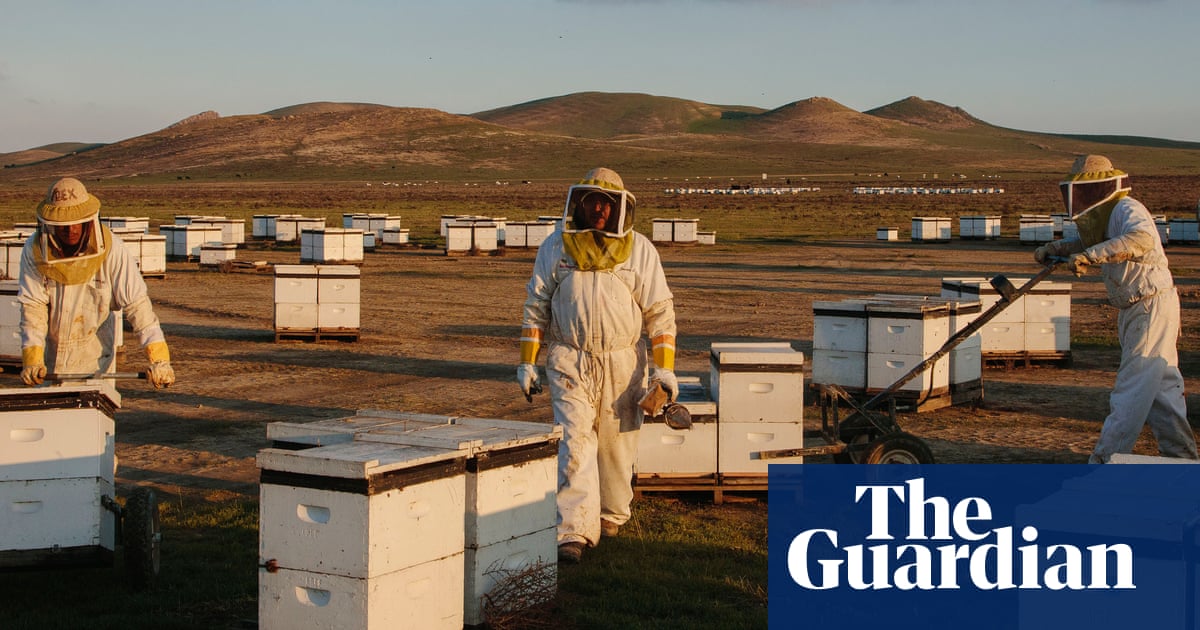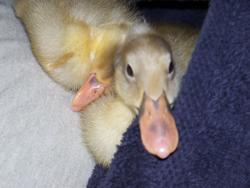Those who understand ecology on a level that doesn’t have cheap commodities as a prerequisite understand there’s a straightforward solution to this. Restore natural pollinator habitat (fuck your lawn) and stop treating them like slaves.
I bought 5 pounds of clover seed this spring and spread it through my lawn… and it’s amazing. I plan on getting 20 pounds this fall and doing the rest of my lawn, and probably going to get some creeping red thyme for my fence rows.
Wild ginger is a great ground cover, too. Stays short naturally, feels good to step on, doesn’t need much water.
How does that fix a virus spread by parasitic mites?
Well we could stop dousing our planet in poison just for weed free and pest free grass, for starters. I know it’s not as bad as what we use on farm crops, but every little bit counts. The bees are stressed and dying because of that stress.
Let me be clear: natural lawns are a good thing, and my wife and I are converting over piece by piece. However, I think people jumped to that conclusion here because they’re already preconditioned to it. Natural lawns are never going to undo the damage caused by overuse of agricultural pesticides.
Yeah, just because we can reduce our use of pesticides doesn’t suddenly make all of the bee colonies we killed with it come back to life. I get that.
But nature is resilient and if we stop dousing everything in nerve toxins then maybe we’ll see the ecological web of insect life doing its thing again. That improves the soil and plant life, gives food to small critters, and both of those indirectly helps the bees. So it kind of does undo the damage in a roundabout way.
You need to convince farmers of that, not people who own suburban lawns. Though people with suburban lawns should convert over, their affect is going to be small compared to hundreds of acres of farm run by a few people.
Yeah I already said that in my first comment.
Tangentially related question:
What is the latency in the soil for this stuff? I spent 8 years working on getting my yard back to a pollinator friendly environment but we are moving now and starting over with a basic grass yard. I am assuming the previous owners were spraying all kinds of shit as we are out in the burbs.
It’s pretty quick. Insects come back in about two years, although it can be a little weird- you may get massive population growth of bugs you aren’t thrilled about ( we had a year of millions of earwigs first)
then predators (one year was baby lizard mania )
Bumblebees really took off about 3 years in. Birds too.Do you have any resources you can share for what you’ve done and will do again? My yard right now is very sparse. Literally no grass, but has 3-4ft tall weeds, moss, rocks, and a lot of mushrooms. I don’t necessarily care if I ever have a perfect lawn, but I’d like something else… more appealing.
By no means am I an expert so do some reading for your area. That said, here is how I set up my space.
I am a big fan of planting stuff that you can eat, that attracts polinators, and is low maintenance.
We have a couple varieties of basil that we let flower that brings bees in and are perennials and rosemary that flowers I have some really big mint plants that the bees love too. I basically do nothing to any of those and just let them ride. I have a couple of citrus plants that flower and bring in lots of insects. I planted grape vines that the birds love and have been really fun for my kids. They also loved the blackberry vines.
Any time I have the big clumps of clover in the lawn part of our yard, I move them to the flower beds. We also have several jasmine plants that crawl around.
I tend to do the local heirloom wildflower mixes in our side yard areas which was super great to cover up the utility boxes in our yard.
Heirloom stuff is great, I have several plants that I have re-grown from seeds inside fruit that the pests got to. 100% recommend.
I like to keep citronella and lemongrass around to help with the mosquitos. The lemongrass probably doesnt do anything unless you burn it but you can pick the citronella leaves and rub them between your hands then rub your hands on your skin and that seems to work.
Keep a fountain or bird bath around for the bugs/birds. If you can do it low to the ground, you can get frogs and other stuff too.
I tend to keep some brush in a pile for some of the other critters like salmanders, the little garden snakes, skinks, etc. You can get rats/mice though so ymmv. Rock piles are also good.
When the oak/ash trees drop leaves, I mulch them with the mower and collect them for use around the tree bases, that is supposed to be good for fireflys and stuff.
We have not watered our garden at all this year.
If you can find native plants, use them because they are already adapted to your area.
I tried to do microclover for our yard but since we had grass already it didn’t really take off. I also tried using buffalo grass with the same result. I do tend to let our grass go longer, its better for water conservation and I refuse to use clean water for grass growth.
For compost, we do table scraps mixed with leaves and yard clippings. I didn’t do it properly and ended up accidentally planting 10,000 papaya plants in our yard that the freeze killed off.
I have some blue salvia looking tree thing that is constantly covered in pollinators that grew super quick. They plant them on the highway medians around Houston and its been awesome. The flower smell great too.
For compost, we do table scraps mixed with leaves and yard clippings. I didn’t do it properly and ended up accidentally planting 10,000 papaya plants in our yard that the freeze killed off.
Thanks for the giggle.
I’m curious, when the lawn is kept natural, doesn’t it have a lot of ticks?
Probably not unless you have lots or animals crossing it. Ticks require hosts to feed and transport over significant distance I think.
My lawn isn’t totally natural because I mow it, but I don’t use any chemicals. Despite some trees and shrubs, my yard doesn’t have ticks. We have grubs, mice, shrews, squirrels, birds, and occasional poison ivy that we pull up, but no ticks. They are in the park (with forest) a couple blocks away, but not in the trimmed lawns in my chunk of suburbia.
from Wikipedia:
Ticks like shady, moist leaf litter with an overstory of trees or shrubs and, in the spring, they deposit their eggs into such places allowing larvae to emerge in the fall and crawl into low-lying vegetation. The 3 meter boundary closest to the lawn’s edge are a tick migration zone, where 82% of tick nymphs in lawns are found.
In context of bees isn’t the trim important? I mean, for the grass to have flowers for the pollinators, shouldn’t it be untrimmed? And hence prone to inviting ticks?
You are correct, but I mow kinda high and my lawn has lots of low flowering weeds and flowering shrubs. In the spring, there is patch of … probably purslane? and daffodils on the border. Then the comfrey has its first bloom, then the clover and dandelions. Right now there’s more dandelions and comfrey’s second bloom. Next comes the invasive morning glorys and rose of sharon. There are a bunch of other things that flower, like wild strawberries, wild violets, and yarrow that is stanted by getting chopped down every week or two – but there’s more and I don’t know all their names.
We also have some type of carpenter/bumble bee trying hard to destroy the edge of the porch overhang. I’m just letting them do their thing and plan on repairing it if/when it becomes a structural issue.
Clearly what we need to do is ban plastic straws some more.
There are diverse pollinators that are native. These honeybees are not native to the Americas. Having a spread of native species do the job should be more resistant to these kinds of infestations.
Okay but how do you create billions of diverse native species in South Dakota and ship them across the entire nation while they’re all actively hostile to each other?
You would need to create competitive local pollinator markets in every state or risk creating a famine by banning Honeybees.
Like it or not, nature cannot handle Humans in the numbers we currently exist in and Honeybees are a part of our food chain to sustain those numbers.
I believe it would lead to fewer chances for the mites to migrate between colonies - i.e. more flowers == less bees per flower == less chance for a mite to jump from a bee to a flower to a bee/different hive.
That’s just a guess tho and my gut also says that climate change isn’t helping.
Did you read the article? Freeing the slaves gives them the capacity to recover.
Dave Goulson, professor of biology at the University of Sussex, says the study provided no evidence that the viral load was higher in weaker colonies. “Almost all bee colonies have these viruses, but they only do significant harm when the colony is stressed.”
That would save colonies near suburban areas. That would not save colonies surrounded by hundreds of acres of farm. There is far, far more farmland in the US than suburban yards.
You do have a point.
Slaves? Oh FFS. Have you talked to the bees lately? Maybe they like having nice manmade hives.
They don’t. The process of getting them to make honey is based on driving them to be in panicked, disaster recovery mindset all the time.
Well, Scott, I’m beginning to think you’re no apiarist at all.
I think honey is just the byproduct of these colonies. Their primary use is to loan them out to farms to pollinate the crops.
Lawns aren’t the problem, it is agriculture. Now the problem is affordable food vs the environment.
Lawns aren’t the problem but they are a problem
Our entire yard is a garden.
1/4 acre of fruit and nut trees, berry bushes, local flowers, shrubs, grasses, a lot of vegetables, a greenhouse, chickens, a small swamp. It’s gone from a grey clay death zone to a deep beautiful rich soil and an area that is teeming with life and food for all the life it supports. It is regenerative and balanced. To offset our agriculture practices we keep 250 acres of old growth forest under our care and protection. Permaculture, Korean natural farming, modern and traditional farming and environmental knowledge all play a part in what we have accomplished.
It wasn’t easy to get here. We aren’t rich and we never will be. Just know it is possible. Before we lived in our little paradise we converted a regular city lot to the same type of setup.
I’d love to be able to do this.
Scientists have been scrambling to discover what happened; now the culprits are emerging. A research paper published by the US Department of Agriculture (USDA), though not yet peer-reviewed, has found nearly all colonies had contracted a bee virus spread by parasitic mites that appear to have developed resistance to the main chemicals used to control them.
Varroa mites spreading disease.
Adee says: “We had mites for 20 years, and we never had over 3% losses.” He believes there is a “combination of things” that makes the bees more stressed and the mites more deadly.
He cites the use of neonicotinoid insecticides in the US, which harm bees’ nervous system, paralysing and ultimately killing them. Some researchers have warned of neonicotinoids causing another “silent spring”, referring to Rachel Carson’s 1962 book on the effects of the insecticide DDT on bird populations.
Dave Goulson, professor of biology at the University of Sussex, says the study provided no evidence that the viral load was higher in weaker colonies. “Almost all bee colonies have these viruses, but they only do significant harm when the colony is stressed.”
Capitalism, fucking up the ecosystems since 18th century
In case anybody was wondering, the honeybee declines in China and Europe are also substantial and worrisome. I haven’t heard about Africa but I think it’s safe to assume when there’s missing data for a global problem that it’s affecting them, too.
Even the honeybees don’t want to be here anymore
‘Could’ is doing a whole lot of heavy lifting there.
I think it’s accurate. The article points out that Varroa Mites have become resistant to all known chemical pesticides used to control them previously. So if A) Bees develope resistance tot he virus spread by the Mites or B) humans develop new mite control solutions, then there won’t be a death spiral.
Hello, goodbye, t’was nice to know you
How I find myself without you
That I’ll never know - Honeybee
I let myself go
Are they just farmed European honeybees or our natives dying off too?
Yes and no. It’s complicated.
I know :(.
And even non natives are pollinating
It’s just bad
Yes.
Fits perfectly. Fruit that does not grow does not need to be harvested by non-existing farm workers.
deleted by creator
The image’s caption:
Bret Adee, one of the largest US beekeepers, has 55,000 hives used to pollinate crops. As monoculture farming spreads, bees have to be moved across the country, especially for almonds, blueberries and cherries. He lost 75% of his bees over the past year. Photograph: K Brinson/New York Times/Redux/eyevine
A quick Google search reveals that his operation, Adee Honey Farms, is in South Dakota. here’s another article on this subject with a different photograph of the same place. Their web page doesn’t have many photos of the field in question, but there’s a couple.
This is not an AI image.
This is what large scale pollination companies do. They haul in tons of hives around various crops and let them do their thing for a while and then pack up and move to the next one. Basically these bees are like sailors going port to port, spreading all of their goodness around.
deleted by creator











